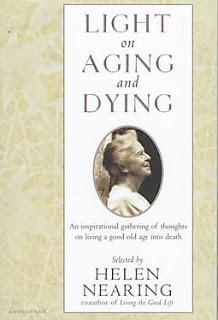
2nd Edition Published January 15, 1998.
For the last six years, I've been gathering quotes about aging. However, I just discovered this treasure of quotes by Helen Nearing.To whet your appetite, here is the quote that manages to convey a lot of insight in a few short words:
"Let life ripen and then let it fall." Lao TzuNearing (b. 1904) and her husband, Scott Nearing (b. 1883), were New York intellectuals who left the city to live in rural Vermont.
He was a well-known political philosopher and radical. Together they ran a large property and wrote books for city-suburban dwellers about the value of returning to a rural life.
Scott was a little more than 20 years Helen's senior, so even though he lived until he was 100 years old, Helen lived another 12 years as a widow.
Already a voracious reader and contemplative by nature, these years without Scott gave Helen Nearing more opportunity to meditate on the interplay between aging, wisdom, spirituality, and death.
As a gerontologist, I feel very strongly that aging be depicted as a vibrant era of life: an age of growth and social engagement. Nevertheless, older adults (in industrialized nations) do encounter death of their partners and peers and do contemplate their own deaths with more depth than people of any other age group.
In her introduction, Nearing writes,
"There are techniques for dying well, just as there are for living well. There are ways of transition, sane approaches to death. We can make a conscious and worthy exit. Dying can be a natural and desirable process, a happy act, a rendering back to the whole what has been separated for a time--a willing and glad restitution, almost a celebration of successful aging" (p. 13).After watching her husband in 1983 choose his own means of death by gradually refusing food until his body shut down, Nearing spent another 12 years adding to her already extensive collection of quotes.
In 1995 Nearing published her treasury. She organizes the quotes into three categories. What follows is a sample of some of the quotes from each of these three sections:
"The Good Old Age"
"Too many among us have been way-laid by age and surprised by Time, ready to resign, to submit, to surrender to the myth of 'old age'....It cannot be too often repeated that the growing old of the body does not mean that the spirit has to grow old too. Our conception of old age is a bad habit to which most of us have been conditioned too early."
Ashley Montagu Growing Young 1981
~*~
"There is only one solution if old age is not to be an absurd parody of our former life, and that is to go on pursuing ends that give existence meaning -- devotion to individuals, to groups or causes, social, political, intellectual or creative work."
Simone de Beauvoir Old Age 1972
"The Art of Dying"
"Death is a process of at-one-ment....Through death, a great at-one-ing process is carried forward. In the fall of a leaf and its consequent identification with the soil on which it falls, we have a tiny illustration of this great and eternal process of at-one-ing."
Alice A. Bailey Esoteric Healing 1953
~*~
"When the leaves fall, the whole earth is a cemetery pleasant to walk in....how beautifully they go to their graves! How gently lay themselves down and turn to mold. They teach us how to die. One wonders if the time will ever come when men, with their boasted faith in immortality, will lie down as gracefully as ripe -- with such an Indian-summer serenity will shed their bodies." Henry David Thoreau "Fallen Leaves" 1862
"Death, The Greatest Good"
"In every unbeliever's heart there is an uneasy feeling that, after all, he may wake up after death and find himself immortal." H.L. Mencken
~*~
"The body is mortal, forever in the clutch of death. But within it resides the Self, immortal, and without form. Riding above physical consciousness, knowing the Self as distinct from the sense-organs and the mind, knowing Him in His true light, one rejoices and is free."
Chandogya Upanishad [Ancient Hindu text. Circa 7th century BCE]
Secure a copy of her book to find even more thought-provoking quotes from writers spanning several centuries, continents, and world views. Nearing didn't just draw on the classics. She has selections from 20th century writers as well, authors responding to the longevity of the modern era and the medical interventions that give people more time to ponder the meaning of life, age, spirit, and death as they occupy that space between their health span and their life span.
Related:
Quotes on Aging
Books on the Dying Process
Books on Aging and Spiritual Growth

